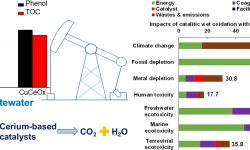Fracking wastewater treatment: Catalytic performance and life cycle environmental impacts of cerium-based mixed oxide catalysts for catalytic wet oxidation of organic compounds

Fracking is a controversial technique that involves injecting water, sand and chemicals into shale rock to extract natural gas. One of the main challenges of fracking is how to treat the wastewater that is generated, which contains high concentrations of salt and organic pollutants. A new study conducted by the…




